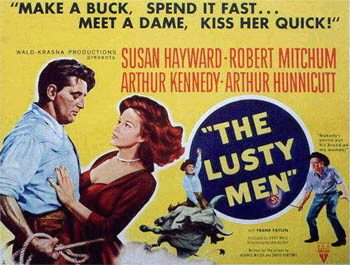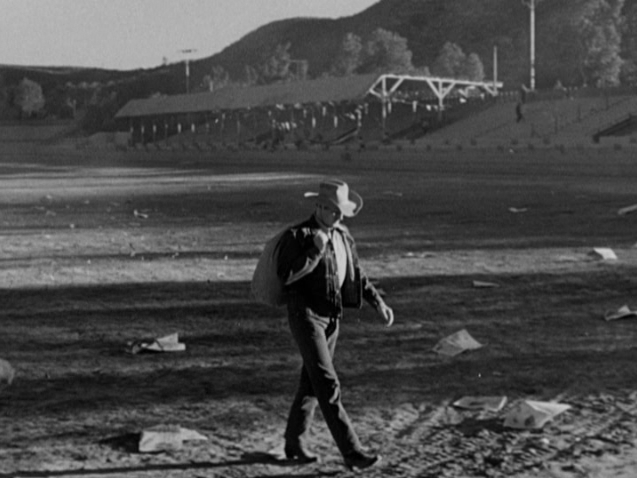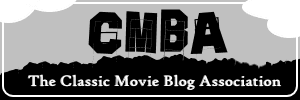Summer Under the Stars presents Nicholas Ray’s The Lusty Men, part of TCM’s 24-hour tribute to Robert Mitchum
“There never was a bull that couldn’t be rode, there never was a cowboy who couldn’t be throwed. You eat a little dirt if you have to. —Jeff McCloud
Hayward the fulcrum in the triangle, flanked by Mitchum and Kennedy. Note that Kennedy is framed by the windshield, cut off from them by his secret ambitions and desire to be a star
The Lusty Men, Nicholas Ray’s 1952 western, was one of Mitchum’s own favorites among his movies. And I’m with him, though I’m definitely a much bigger Mitchum fan than Mitchum was, and I just love movies of his that he never even bothered to watch. Ray said that when he was 3/4 done with editing, Mitchum asked if he had any film he could see, so Ray set up the seven reels that were in good shape and put Mitchum in a screening room. When Mitchum came out, Ray said, he looked about ten feet tall. The two repaired across the street to the bar for a celebration. Many hours later when Ray finally slunk home, the last he saw of his star was Mitchum in the kitchen with some FBI agents, shooting into a sink of dirty dishes.
I?m new to westerns. That is, having grown up in Dallas being stereotyped by outsiders, I looked down my nose at horse operas. When I was a teen I saw Sergio Leone’s four Clint Eastwood westerns at a dusk-to-dawn drive-in, but Leone’s movies were sly comments on the genre. Ditto for his brilliant Once Upon a Time in the West. Eventually I saw Stagecoach and fell hard, and then Ford’s Cavalry Trilogy and My Darling Clementine, and then more recently 3:10 to Yuma and Shane and others. It?s wonderful to have a whole new genre to explore.
Anyway, I’ve wanted to see The Lusty Men for a long time because of a single shot that I saw in a documentary maybe 20 years ago. That shot was so beautiful it left me kind of stunned. Despite my snobbery it made me want to see the rest of the movie real bad because it packed so much poetry and grief, and it was obvious that a shot like that couldn’t have come from an ordinary western.
It’s one of the most haunting 20 seconds I’ve ever seen. About five minutes in, Jeff McCloud (Mitchum) has just been thrown and set upon by a wild brahma bull. He survives, but after the crowds have gone home, he limps silent and alone across the deserted arena, with dust and sheets of paper dancing around him in the ghostly wind. Nobody has ever looked more alone, lost, beat.
That exquisite shot also tells us that we are not in the world of the classical western, where either civilization triumphs over nature or law beats corruption and savagery. This is a post-World-War-II western, where the frontier has been eaten up by highways and neon, and men struggle to find their place, to not be endlessly tossed in the wind.
The shot was in Visions of Light, a wonderful AFI documentary about the history of cinematography. TCM runs it once in a while, and it is finally available on DVD. It is a really good movie, not to be missed, and Mitchum’s performance is only one of the many things it has going for it.
Like the cinematography: The Lusty Men was shot by the great Lee Garmes, a veteran whose work went back to the silent era and whose credits include Scarface, Shanghai Express, Duel in the Sun, Stormy Weather, and Nightmare Alley. Ray talked about the “sexy loininess” of the hills as Garmes shot them, reclining in dense, velvety shadows.
Like Mitchum’s costar: Susan Hayward is fantastic as the earthy, grounded woman who knows what she wants and isn’t going to be sidetracked by her husband’s vain dreams of glory. Hayward and Mitchum play off each other so well, her steely strength and determination against his flinty implacability, his weary worldliness and self-deprecating dignity. Everybody in this movie down to the bit players is good, though Arthur Kennedy’s ambitious, naive cowboy is a bit of a stretch for a fella with a New York accent and a salesman’s opportunistic eye. But Hayward, who is sometimes so tough I find her hard to appreciate, is pitch-perfect here, and I credit Ray for that.
Mitchum had made more than 40 movies when he got to this one, but he said that before this his method consisted of showing up and asking where his marks where, then hitting them. Ray wasn’t that kind of director. His New York theater background and unique temperament meant long periods of him staring mutely from his chair at one actor or another, waiting for a mystery about their character to reveal itself. This was strange to Mitchum, but he seems to have found his way into his director’s deep, contemplative silences—he called Ray “the mystic.” Mitchum was, despite his endless protests, an first-rate actor. He was big and broad-shouldered, sullenly handsome, an invitation to caricature with his sleepy eyes and dimpled chin, his face all angles. He had a beautiful speaking voice, powerful and low and dark brown. All this good material for a movie star, but he had more: real talent and sensitivity (though he never indulged in taking himself seriously), a fine way with a joke or throwaway line, and a taciturn quality that didn’t read as wooden but hinted at strong feelings just below the surface. He was already a big star when he finally got to work with Ray, a director who had the patience to get inside him and mine Mitchum’s reserves of melancholy and pain without betraying his essential reticence. Mitchum knew a good part when he saw one, and between him and Ray and screenwriter Horace McCoy, they made Jeff McCloud into a fantastic character.
In The Lusty Men, Mitchum goes deeper than he probably imagined he could, and finds a bruised vulnerability, a raw, just-hatched self-awareness that seems to have struck Jeff in the movie’s opening, in those endless seconds when Razor the bull was kicking the crap out of him.
The dialogue is awfully good. The story isn’t exactly groundbreaking: A beat-up rodeo veteran mentors young, ambitious Wes Merritt (Kennedy) into a great first season rodeoing. But Louise (Hayward), Wes’s wife, doesn’t want him to be a rodeo star. She wants him to stay on at the Jackhammer Ranch, where he hands her his pay and she socks away every cent she can so that in a few years they’ll be able to buy a place of their own. The place they have in mind is the house McCloud grew up in, or where he was a child, anyway. We get no details about his family except that there?s no sign of them when he shows up at the house, looking for something to connect to after 20 years away, 18 years on his own in the rodeo.
Jeremiah: You got anything you own?
Jeff: What I started out with—a strong back and a weak mind.
Jeremiah: A shack, some rocky ground, a spavined horse and a busted windmill. That’s all I got.
Jeff: It’s still more than me.
Jeremiah: Yeah, but you ain’t 62 yet. You a thinkin’ man?
Jeff [sadly]: Oh I can get out of the rain, that’s about all.
Jeremiah: Me, I’m a thinkin’ man. This is what I think. One of the things that’s wrong, is all the books and rules on success is written by successful men, and that’s wrong. Fellers like you and me’d get a lot more help if books and rules on success was written by failures. That’d make sense.
Wes has talent and cujones, though he comes up short on brains and common sense. Louise came from nothing, and she married Wes because, of all the men who wanted her, she thought he wanted a home as bad as she did. Turns out she was wrong. She thinks Jeff is leading Wes astray, but Jeff just pointed at a part of Wes’s nature Louise had never seen.
Actually, it’s Jeff and Louise who share a deep desire for a home.
Horace McCoy, veteran newspaper reporter and novelist (They Shoot Horses, Don’t They?) turned screenwriter wrote a lot of the script, based on a magazine story by Claude Stanush. Mitchum was working with Ray nights on story ideas to flesh out the skimpy 17 pages of script they had when they started. But the dialogue is wonderful, whether it’s McCoy’s or improvised.
Jeff: Who does the saving?
Wes: Oh, she’s the banker. I just hand her my pay.
Jeff: Ain’t it surprising how romantic women can get about money?
[Wes laughs]
* * *
Louise: Wes tells me you once made $3,000 in one day, rodeoing.
Jeff [looking down]: Yeah, that’s right
Louise: And threw it all away.
Jeff [looking slightly pained]: Oh I didn’t throw it away, it just sort of floated.
Louise: That’s pretty stupid. Breaking all your bones, then letting all the money go.
Jeff: Well, some things you don’t do for the cash there is in it. Some things you do just for the buzz you get out of it.
L: One minute on a crazy horse?
Jeff: A minute? 10 seconds is enough to make it feel like a lifetime.
Louise: And wind up with a snapped neck.
Jeff: Or a dislocated collarbone, have your brains shook loose by a bronc. Yeah, I know. I come out of those chutes a lot of times, heard the crowd holler, on a bucking horse or a bull, jumpin’ and twistin’ underneath you. I always felt the same thing. For a little bit there, you’re a lot more than you are just walkin’ down the street or eating or sleeping. Maybe it’s something you can’t explain to a woman.
Louise [bristling slightly]: Why?
Jeff: Cause it’s a different kind of buzz. Thanks again for the supper. Been a long time since I had a supper that good.
This is one of those movies that came together when it probably shouldn’t have, from a cobbled together story, from Ray’s deep research into rodeo life and what people were hungry for after the war (most people surveyed said they wanted a home more than anything), to Garmes’s glorious cinematography, to Hayward’s and Mitchum’s sparring—they start out as enemies, inch their way toward an alliance to try to save Wes from his own stupidity and vanity, and then in Jeff’s confession of hopeless love for her, Louise finally finds the willingness to walk away from Wes, to stop following him on his road to perdition. Wes calls Jeff out in public as a parasite, Louise asks him to please keep Wes from ending up like him, and the big lug signs up to rodeo for the first time since his encounter with Razor the wild brahma bull.
The rodeo footage is shockingly violent and painful.
The cowboys volunteer to risk life and limb, over and over, face the terrible danger just to feel alive, to make “easy” money, for a little bit of glory. It’s an obvious metaphor for being slammed and beaten to a pulp by life, but in the realness of the footage it is still powerful. They put themselves in danger to perpetuate an illusion of control over their lives, and for a little while they get to think they’ve got the bull by the horns. Until something goes wrong and they get thrown and a bull stomps on their leg, shoulder, neck, head. The movie hits this point relentlessly: In one scene after another characters talk about how So-and-So used to be before his brain got shook loose by a bull, or how this one has been so scared since his accident that he drinks all the time and won’t let his wife say he’s scared, ever. Sometimes, just after one of these painful moments, you can see in Wes’s face how hard he has to work to compartmentalize, to convince himself that it’s never going to happen to him.
Nicholas Ray’s movies exist on a razor edge between hyperromanticism and antiromanticism. His characters are perishing from a lack of love, but they’re either too blind to recognize it when it appears or too wounded to do anything about it.
The Lusty Men is a whole lot of man and a whole lot of woman. The dual focus of the action, switching back and forth between the excitement and danger. of the rodeo scenes and the claustrophobic romantic triangle with emotionally volatile Hayward as its fulcrum would feel rote in the hands of a less-distinguished director. They would move between the two, not connecting them in any vital way (“Meanwhile, back at the ranch…”?). But Ray’s emotional investment in both draws them together so that what happens in the arena sets up what follows in the car or trailer or hotel party. The action and violence of the rodeo scenes have a documentary realism that raises this above the average studio western. And Louise has a lot more substance than most female characters in westerns, which Hayward could demand as the top of the bill. Hayward is commanding in the role, showing her extraordinary range from her best-known mood (tough, hard-bitten) to pity and tenderness she rarely displays.
Louise knows who she is and what she wants, but no matter how hardheaded she is, she finds out she’s been living in a dream. Jeff finds out the same thing. Wes, not so much, but then he’s not the brightest bulb in the circuit.
Louise never had a roof over her head till she was grown. Jeff’s old friend Booker, another ex-champion now hanging on to earn a pittance for himself and his daughter, Rusty, they’ve never had a home—they’re practically homeless. Rosemary the trick rider has made her trailer real nice. “Just like a hotel,” as Louise says. “It is a hotel,” Rosemary replies. We make home out of the materials at hand. Jeff and the other cowboys and their wives made the rodeo circuit home, they become each others’ family.
Jeff finds his home in his commitment to help Louise, his understanding that she loves Wes, not him. He and Louise face the hard truths, and they take their beatings without complaint. Would Jeff’s life have been different if he’d had Louise to keep him in line, or would he have bucked her off and stomped her, like a brahma bull?
If you love Mitchum but think of him as the suave noir guy, see this movie. See what he does with a guy whose future, as Dietrich says to Welles in Touch of Evil, “is all used up.” Losing hasn’t corrupted Jeff, but it has stripped him bare. And standing there bleeding in his love and wounds, he’s better and truer than he ever thought he could be when he was the sweetheart of the rodeo.
Jeff: Lady, the world’s full of prizes. Every fellow likes to take a shot at them. If he misses, fine. At least he tried.
Louise: You tried. What did you win?
Jeff: I made a thousand bartenders rich in my time. I’ve thrown away the down payment for a dozen spreads on a run over a crap table. I had 18 great years, all by myself. Wes has got somebody traveling with him. If I’d had somebody like you, it might have been a different story.
Louise: What would it have changed?
Jeff: Maybe nothing. Maybe everything.
* * *
This post was written for the TCM Summer Under the Stars Blogathon, sponsored by Kristen at Journeys in Classic Film. The blogathon is up for the whole 31 days of August, with posts on every star honored. Head on over and catch up on your reading?









Recent Comments